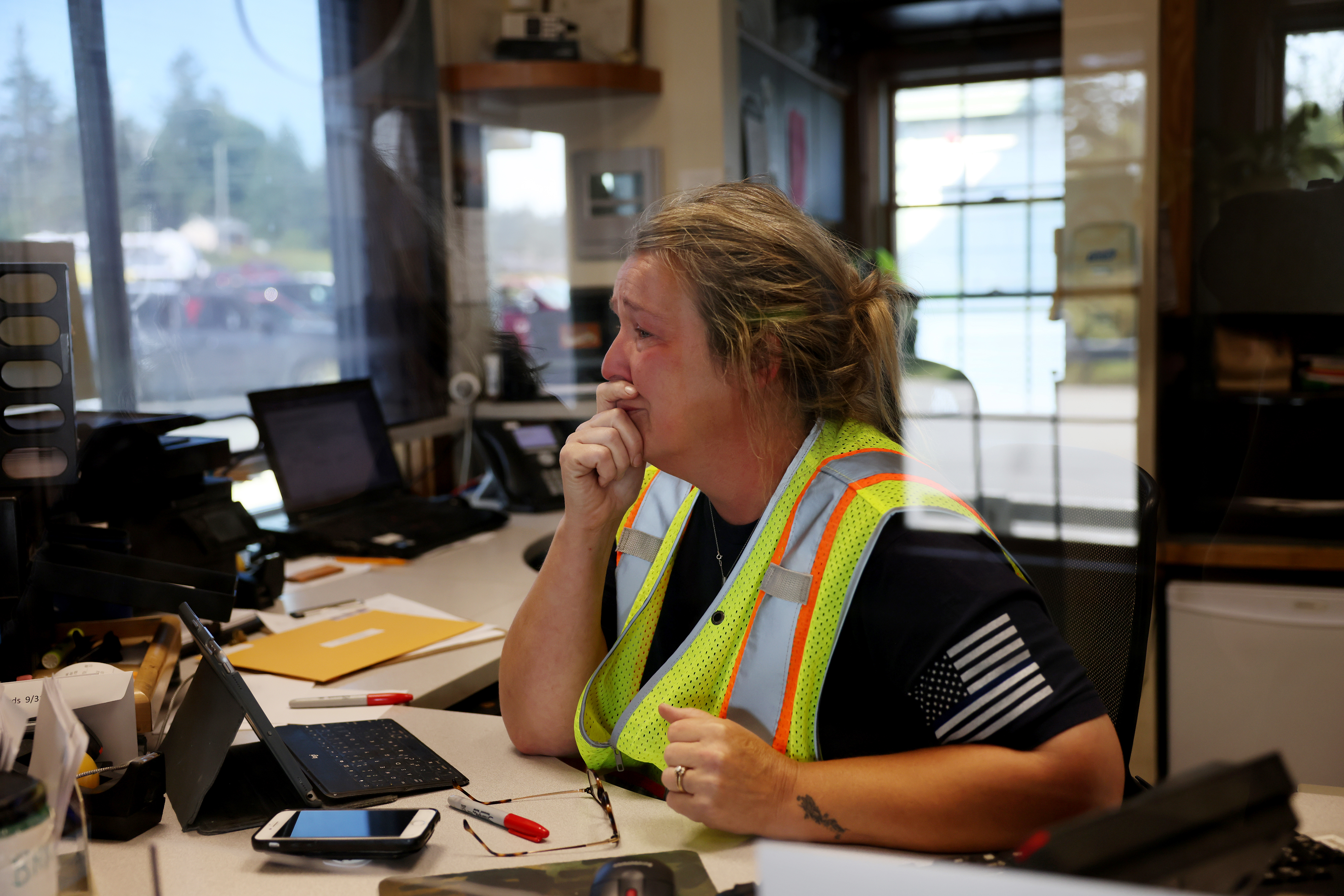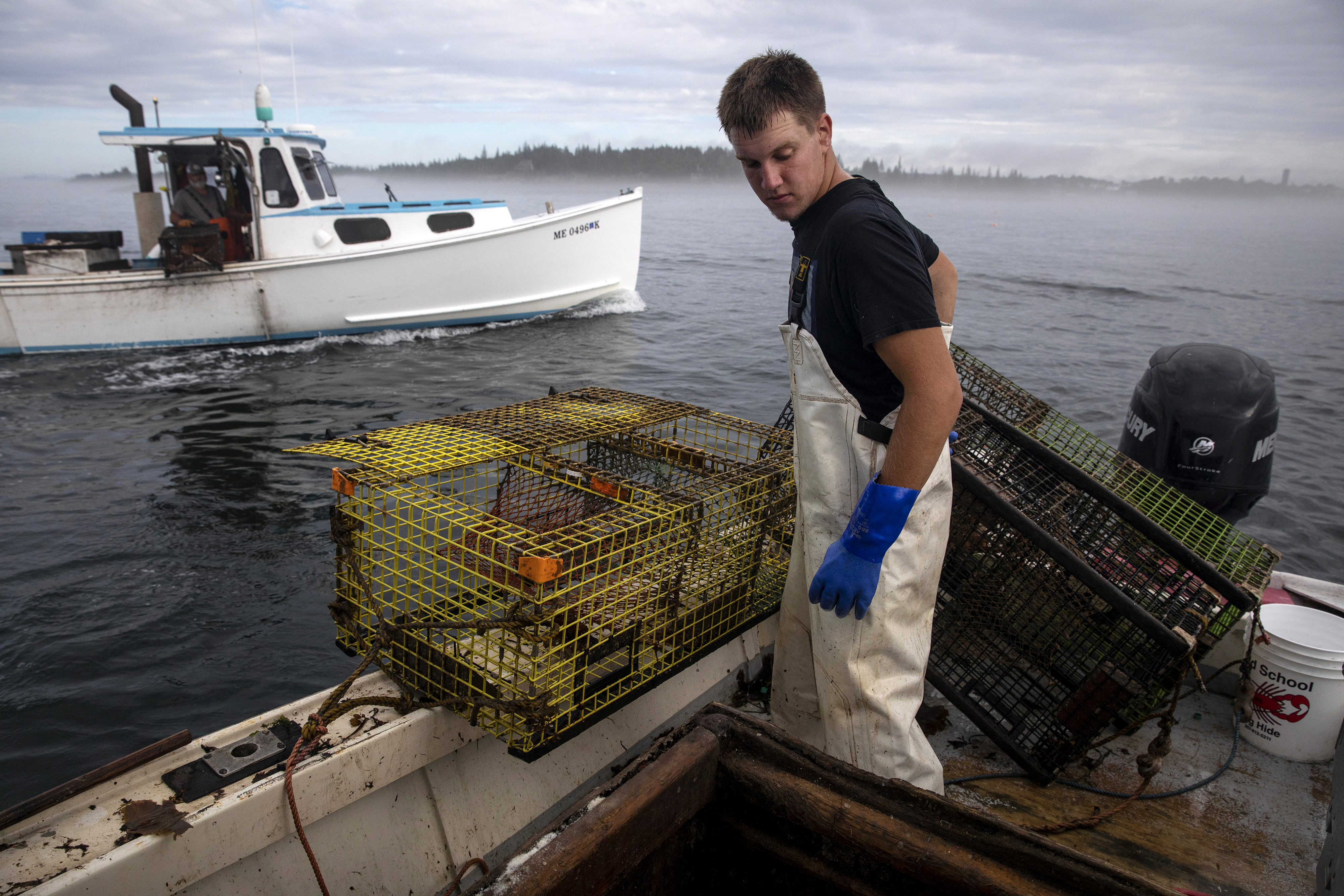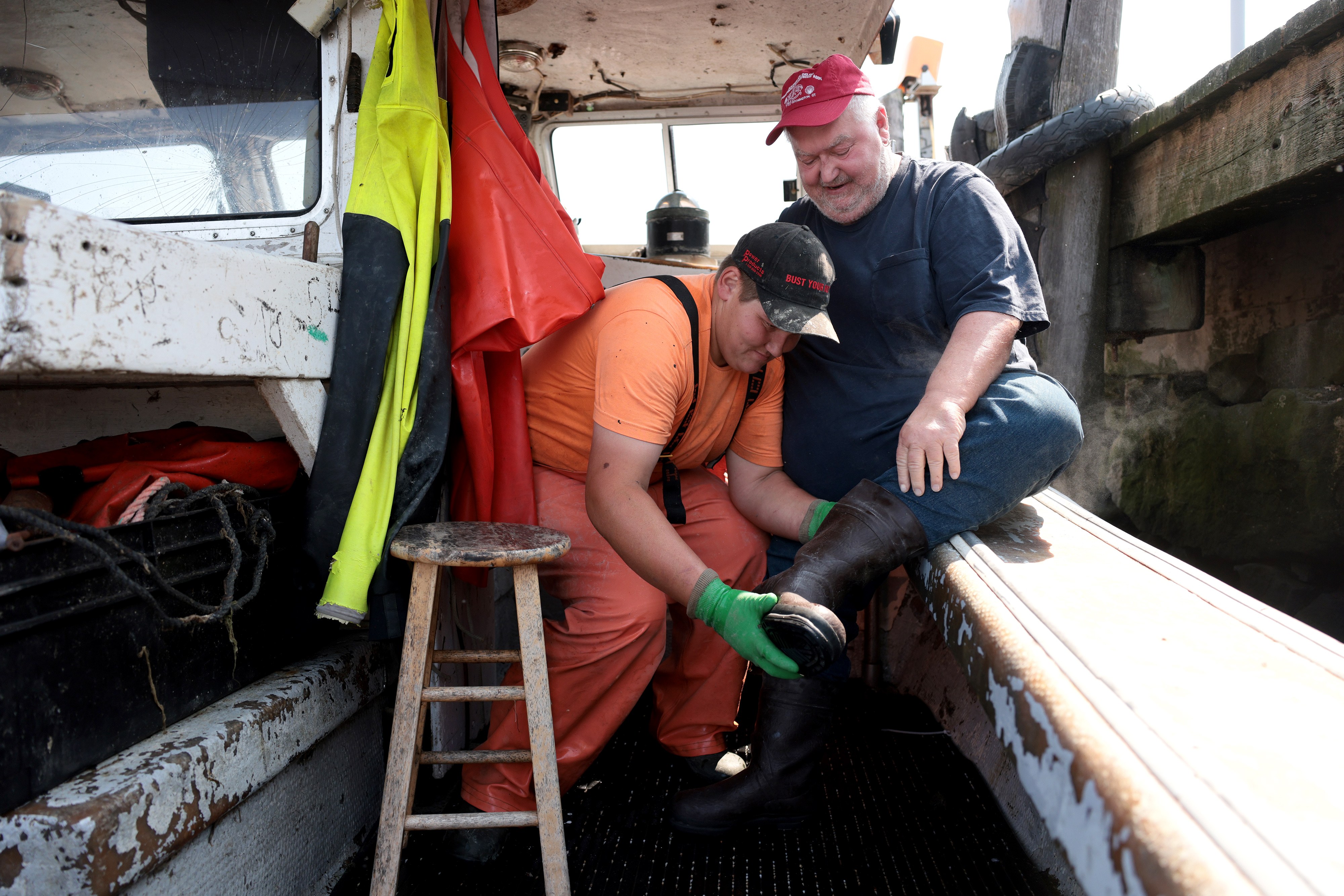The suspense was finally over. Now the lobstermen of Vinalhaven had to face new federal rules that could threaten their livelihood. Despair came first, then decision time.
VINALHAVEN, Maine — When she heard the news, in the middle of her shift selling tickets at the ferry terminal, Cathy Watt broke down in tears.
The US government had just ordered the unprecedented closure of a 1,000-square-mile swath of ocean off Maine’s coast to traditional lobster fishing for four months a year, starting in October. It was the latest in a chain of crushing repercussions linked back to climate change: Warming oceans have hastened an endangered whale’s journey to the brink of extinction, and now Maine fishermen would pay the price.
Watt worried about her lobsterman son, a 30-year-old father of three who had just bought a new house. She nervously twisted her wedding band on her finger as she thought of her husband, a 48-year-old lobsterman and church deacon who counseled other fishermen through tough times — more of which, she feared, lay just ahead.
“It’s not like we can just go down to the next office building and find some new career that will take care of our family,” Watt said as she gestured toward Main Street, home to two dozen island businesses, many of which shut down in winter.
Flustered by the depth of her emotion, she wiped tears away and struggled to compose herself: for her young granddaughter, there beside her in the tiny ticket office with its smell of must and brine, and for the next customer in line.
At stake she felt was the future of their island, and the whole Maine coast.
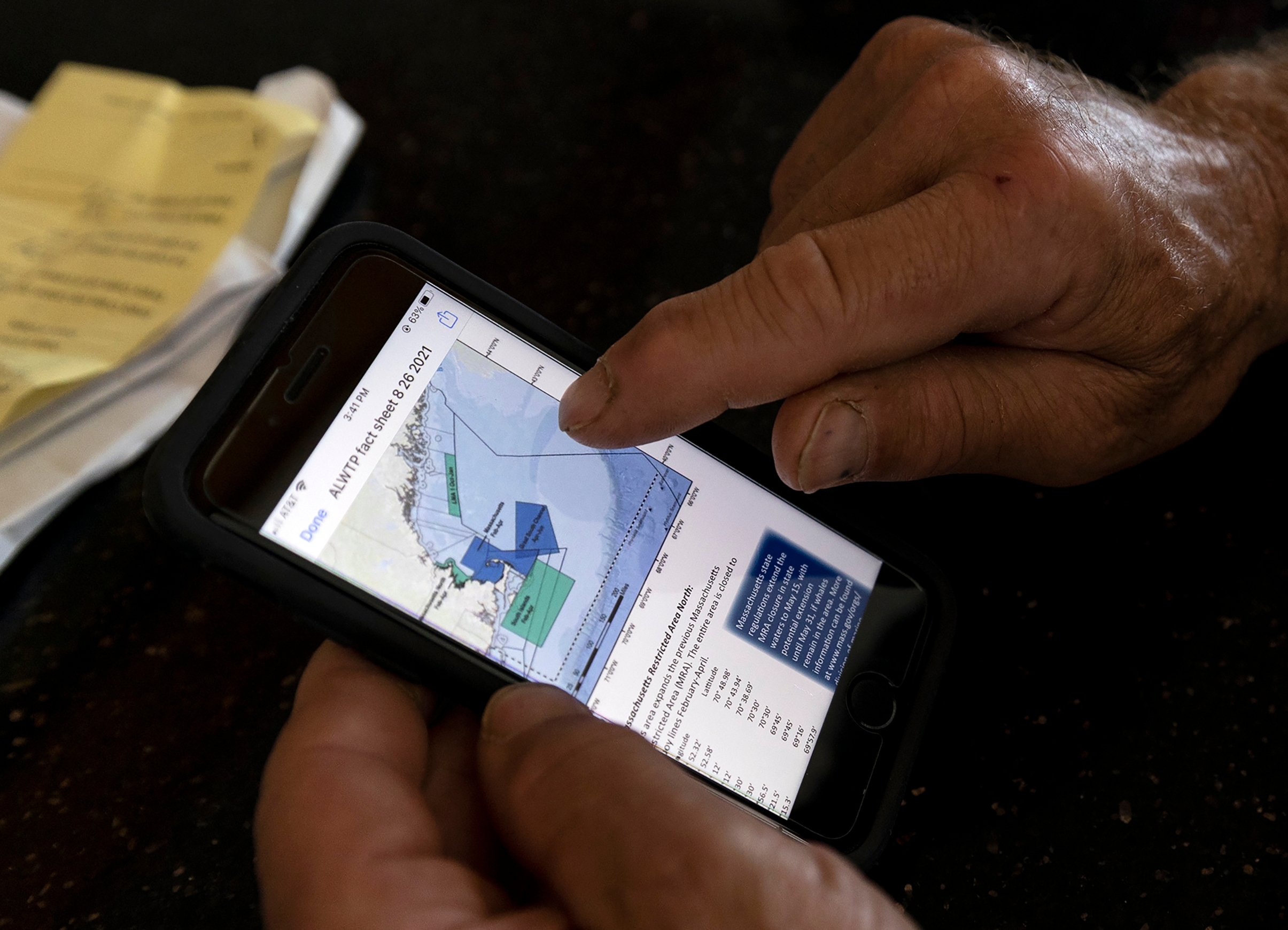
The life-altering consequences of climate change are bearing down on Vinalhaven, an island of 1,200 people 15 miles offshore, wholly dependent on lobster, where the pounding waves of change grow louder by the day.
When the federal government announced its decision in late August, outrage ricocheted from boat to boat, epithets crackling on marine radio channels.
Johnny McCarthy, one of the most open-minded lobstermen on this hidebound island, saw his cellphone light up with a flurry of texts and calls from his wife, Ali. What does this mean for us? Is it bad?
Out hauling traps on his new, $650,000 boat — one big enough to allow him, for the first time, to fish the zone that’s just been targeted for winter closure — McCarthy tried to keep his alarm in check. “I need time to think,” he told her.
Now, he must wrestle with a high-stakes calculation: To keep fishing in the restricted area, will he break with the traditions of his island and convert to whale-safe fishing gear, with its high price tag and uncertain reliability?
Frankie Thompson, the rabble-rousing lobster union boss, will be hit especially hard. He fishes most of his winter traps in the area targeted for closure, and figures the new rules will cost him half his fishing profits and tank his wholesaling business. When he heard the news, he stopped unloading his supply boat and started punching buttons on his cellphone. “Get the lawyers ready,” he barked. “It’s time to go to court.”
For the lobstermen in one of Maine’s busiest ports, in one of the country’s most lucrative fisheries, it felt like the beginning of the end, another harsh blow for an industry already under siege.
Later that night, up and down the coast of Maine, lobstering families gathered around kitchen tables and weighed their future. Inside Watt’s century-old, white-clapboard house on Vinalhaven, she and her husband and granddaughter clasped their hands, bowed their heads over their dinner plates, and asked God for help.
“Father, we pray for our island and the boys of Vinalhaven as we face changes that will make it hard on our fishermen to provide for their families,” her husband, Taza, said, his sweat-soaked baseball cap on the table before him. “We ask that you give our boys the strength to make it through this.”
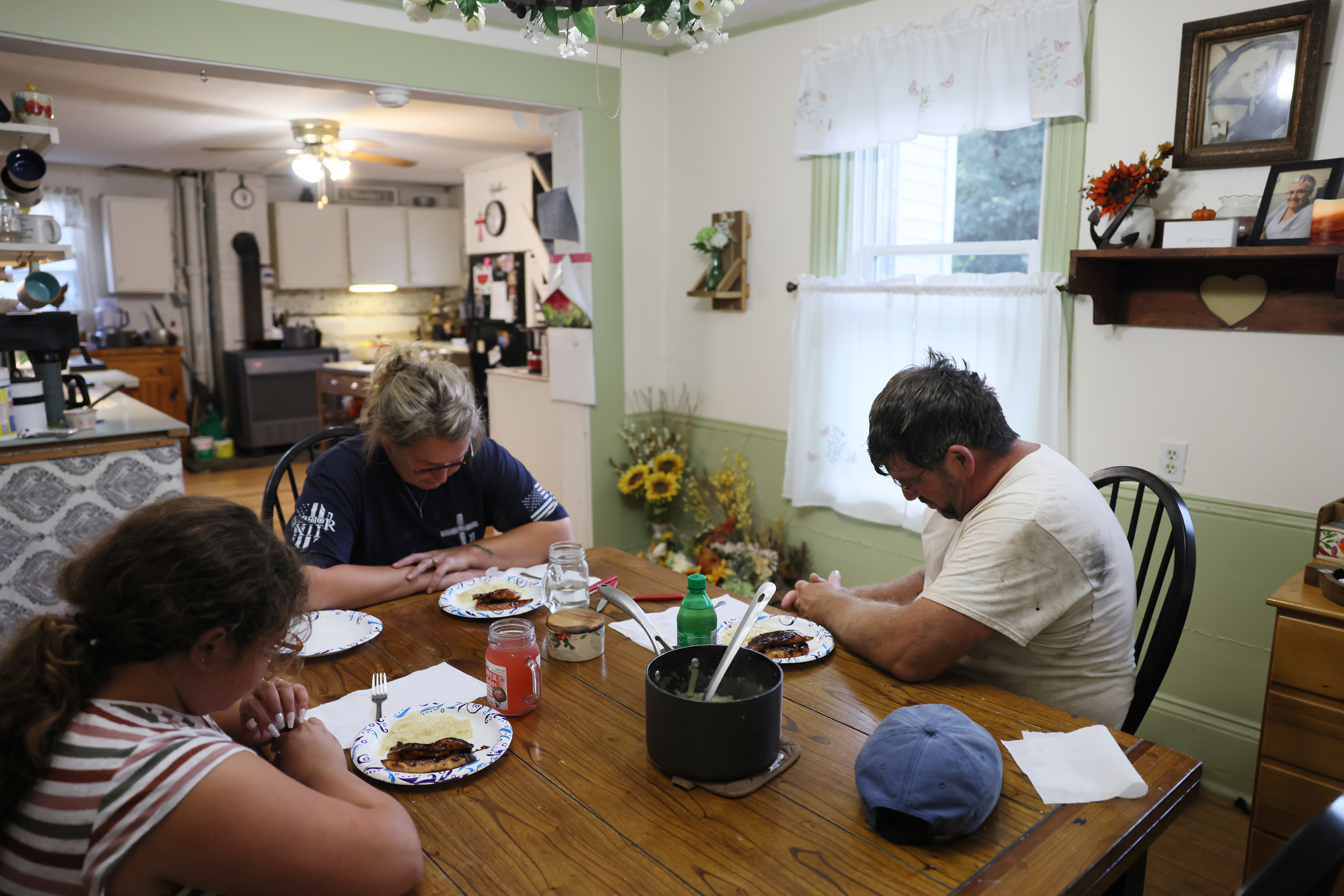
As lobster habitat keeps shifting north to cooler waters, Maine’s losses will be Canada’s good fortune. And that change — with its promise of new riches — is spurring new conflicts between fishermen.
One afternoon this summer, some 130 miles northeast of Vinalhaven, Robert Sack pointed the bow of his old boat toward his clandestine lobster traps in the cold Canadian waters of the Bay of Fundy, expecting to face arrest at any moment.
The rogue lobsterman could not afford the expensive tools and technology used by most commercial fishermen. So he used an iPad to navigate close to his traps, where his brother-in-law dropped a weighty grappling hook overboard. Together, they hauled up an illegal bounty — scores of lobsters — from what has become one of the world’s most prosperous fishing grounds.
In recent years, as the long-frigid waters off southwestern Nova Scotia have warmed, the temperatures in St. Mary’s Bay and the surrounding Bay of Fundy have created a kind of sweet spot for lobster, with the ideal conditions that allow the crustaceans to thrive. Since 2000, the lobster catch across Atlantic Canada has more than doubled, while its value tripled to nearly $1.3 billion ($1.6 billion CAD) in 2019 — more than twice the value of New England’s lobster catch.
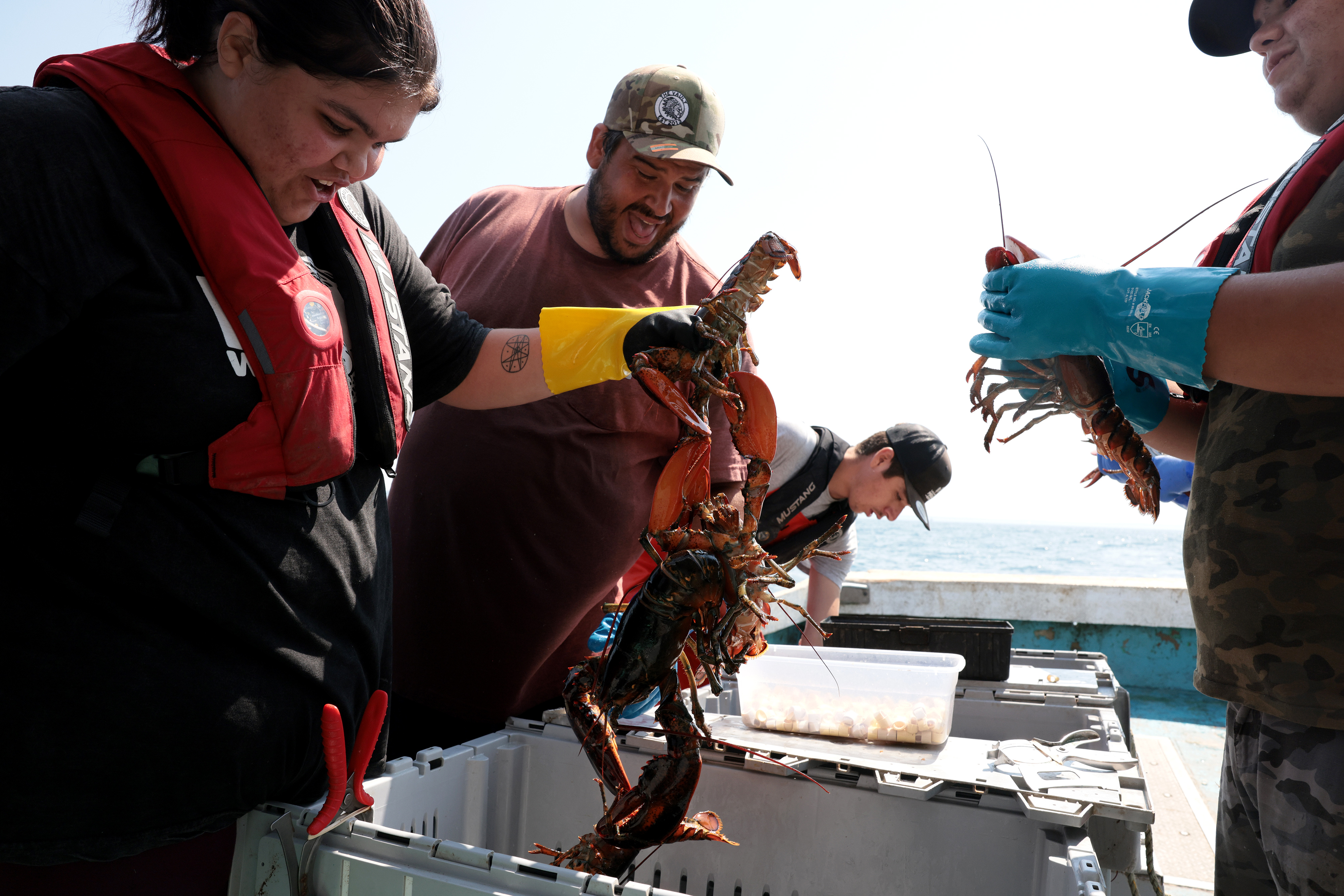
Off Nova Scotia, it’s a fight between commercial lobstermen and the Indigenous Mi’kmaw people like Sack, a member of the Sipekne’katik band, who insist that a 269-year-old treaty grants them the right to lobster when and how they want. But the Canadian government has rejected their assertions, and fisheries officials have been seizing their traps, confiscating their boats, and arresting the fishermen.
“We’re taking a big chance, but if we don’t come out here and fight for what’s rightfully ours, we won’t have anything,” said Sack, 43, who brought several of his children and relatives to fish with him.
Since 1974, the hub of the Atlantic lobster population has shifted by 110 miles to the north, according to Malin Pinsky, an associate professor of ecology at Rutgers University who studies how climate change displaces marine species. The relocation of lobster habitat has dramatically accelerated over time: In the 1970s, it was shifting about eight miles north per decade, said Pinsky; today, it is moving more than four times faster, about 40 miles per decade.
The increasing lobster catch has raised the stakes for Canadians, pitting the Mi’kmaw, whose income derives mainly from fishing, against other commercial fishermen.
Some of those fishermen have blockaded Mi’kmaw vessels, sabotaged their traps, and shot flares at them. Others torched a warehouse where Indigenous fishermen stored their lobster, and threatened to burn down another with Mi’kmaw fishermen trapped inside.
“Climate change has thrown a wrench in the traditional ways that some fisheries have been managed, scrambling social structures,” Pinsky said, “and conflict is often the result.”







As Mainers prepare for a likely decline in their lobster catch, the most immediate threat doesn’t involve lobster or politics, but a type of plankton no bigger than a pencil eraser. The plankton, Calanus finmarchicus, is a favorite food of the critically endangered North Atlantic right whale, fewer than 340 of which still survive.
Their traditional summer feeding grounds in the Bay of Fundy have become too warm for the plankton, which plays a central role in the marine food chain. As the plankton population there and elsewhere has declined sharply, right whales have followed their food into colder waters as far north as Canada’s Gulf of St. Lawrence — bringing them closer to shipping lanes and fishing boats.
The consequences have been tragic: 34 known whale deaths since 2017, and a sharp decline in births. Regulators have attributed nine of the whales’ deaths to entanglement in fishing gear, after which they starved or succumbed to infections as ropes cut into their fins, tails, or bones. At least 14 more suffered serious injuries.
Maine lobstermen say they almost never see the whales and aren’t to blame. It is true that no whale has ever been found dead in gear conclusively traced to Maine fishermen, but no gear is recovered in 70 percent of entanglements, says the National Oceanic and Atmospheric Administration, making it impossible to determine the origin.
Scientists say the whales are there, even if Maine fishermen don’t see them, and could die elsewhere after being entangled in Maine lobster gear. Maine only began requiring its lobstermen to mark their gear in 2020.
Amy Knowlton, senior scientist at the New England Aquarium’s Anderson Cabot Center for Ocean Life, said more than 85 percent of all right whales have been entangled in gear at least once in their lives, a problem worsened by the increased strength of fishing lines and the higher density of lobster traps off Maine’s coast since the boom began.
“It’s a chronic, pervasive problem for [whales], and a stress they’re constantly dealing with, that causes dramatic declines in their health,” Knowlton said. “It’s a pretty sad story out there.”
Off the coast of Massachusetts, in a well-documented feeding ground for whales, NOAA has already closed some fishing grounds, beginning in 2015, and says Maine must be next: Its scientists predict that even one right whale death a year will doom the species to extinction in as little as two decades.
Often overlooked is the legal mandate that binds regulators: They must take action to protect the whales — even if extinction is unavoidable.
Canada, too, has been forced to act. Under pressure after the spate of whale deaths, Canadian officials reduced speed limits for boats, closed off thousands of square miles to fishing, adjusted the timing of their crab and lobster seasons, and implemented a system of temporary closures after whale sightings.
The results were clear: no right whale deaths in 2018. But after the government lightened some restrictions in response to pressure from fishermen, whales began dying again, and many of the stricter rules were reinstated. Since then, no right whales have been found dead in Canadian waters.
The same balancing act has played out here, where fishermen across New England have already adapted to layers of regulations designed to save the whales.
Maine lobstermen believe they will be sacrificed instead.
“The opportunity for future generations to continue this proud heritage will be lost,” claimed a lawsuit filed by lobstermen in September in response to the new restrictions. “Lives and livelihoods will be uprooted, and a cultural tradition that has existed for more than 175 years will be gone.”
Knowlton believes both whales and lobstermen can survive. Just as the right whale is adapting to climate disruption by seeking its food elsewhere, lobstermen can adapt to ropeless gear, she said.
“Nobody’s goal is to eliminate the lobster fishery,” she said. “It’s not impossible that they could embrace transition and save this species from extinction.”
In their lawsuit to stop the closure, Frankie Thompson and his fellow union lobstermen expressed a more ominous view: “There are two endangered populations at stake here: the North Atlantic right whale and the Maine lobster fishermen.”
In the uproar that followed the government’s ruling, Frankie Thompson spent September preparing a lawsuit, rallying his troops and harassing politicians. He felt frustrated and abandoned. Where were the industry’s allies? Where was the public outcry? Even many of his fellow lobstermen seemed resigned.
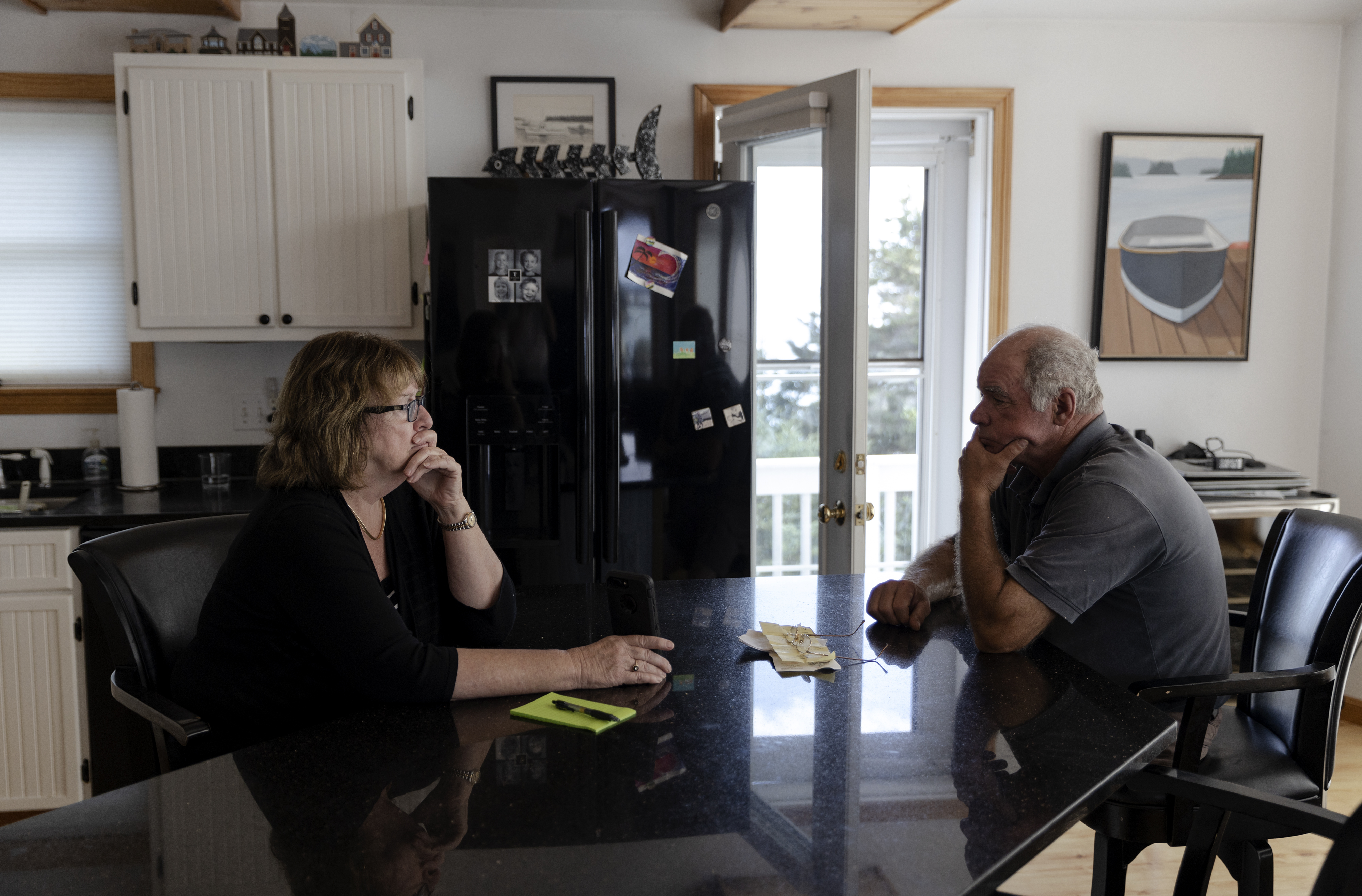
“Pay attention,” Thompson instructed his 15-year-old protege, Tanner Lazaro, as they worked side by side, unloading supplies. “Make no mistake, the government, the enviros, they’re coming for us, for all of us.
“We fight like hell, that’s what we do. Go to court, hit them hard, don’t give up. Fight like your life depends on it, because it does.”
Ever the dutiful soldier, Tanner promised Thompson he would fight. But he also feels the resignation Thompson rails against. He doesn’t have a lot of career options — or any options on the island, really, besides lobstering. He’ll find a way to fish, even if he never scores big like Thompson’s generation.
Since the 2000s, the lobsters plucked from Maine’s waters have been a roaring economic force, pumping more than $1 billion a year into the state in the last decade. Now scientists predict the record-high harvests are over for all but the state’s easternmost ports, and the Gulf of Maine fishery has entered a 30- to 50-year decline, as rising ocean temperatures gradually make Maine waters too warm for lobster, according to a Gulf of Maine Research Institute study.
Another study, published in August, summarized succinctly the trials to come:
“Continued warming is expected to lead to a loss of heritage, changes in culture, and the necessity for adaptation,” wrote the scientists, including the institute’s former director, Andrew Pershing, in the journal Elementa.
The steep decline of lobster in Maine waters is not a foregone conclusion, some scientists say. But it would take an enormous act of human will to prevent it, said Nick Record, a senior research scientist at Maine’s Bigelow Laboratory for Ocean Sciences: an immediate, drastic cut in greenhouse gas emissions, to shut off the tap of CO2 pumping into the atmosphere.
So far, that will has eluded government and corporate leaders.
The looming loss is almost too big to comprehend, in a state that has struggled for generations with the downfall of its critical industries, from the potato farms of Aroostook County to the paper mills of the North Woods. No one can imagine a replacement for lobster: That’s because there isn’t one, at least not yet.
It doesn’t mean they aren’t trying. A handful of Vinalhaven fishermen are experimenting with growing kelp, one of several saltwater crops seen as hopeful avenues for Maine’s future. But even its leading advocates acknowledge its modest economic value makes it a likely income supplement, not a savior for fishermen.
Some wonder if Vinalhaven’s long-term economic survival is likelier to come from the expansion of its tourist industry, now limited by its lone motel and few restaurants. Islanders, who treasure authenticity, express deep ambivalence about the prospect. Do we want to become Camden, or Nantucket? they ask.
Yet in the midst of climate-driven upheaval, there are signs the youngest lobstermen on Vinalhaven may be awakening to what lies before them. At the island’s high school, where a new crop of young fishermen enrolled this fall in the skippers program, most say they are working on a backup plan. As one reflected in September, “I’m just starting to realize it’s not going to last forever.”
In spite of the denial that persists around them, the next generation is catching on: They won’t be joining their fathers’ fishery. When the students ask their science teacher, Dan Ganoza, what they can do about climate change, he urges them to open their minds to adaptation.
“You’ve got to adapt and change the way you’ve been doing it most of your life, the way your parents have been doing it all their lives,” he tells them, “or we probably won’t survive.”
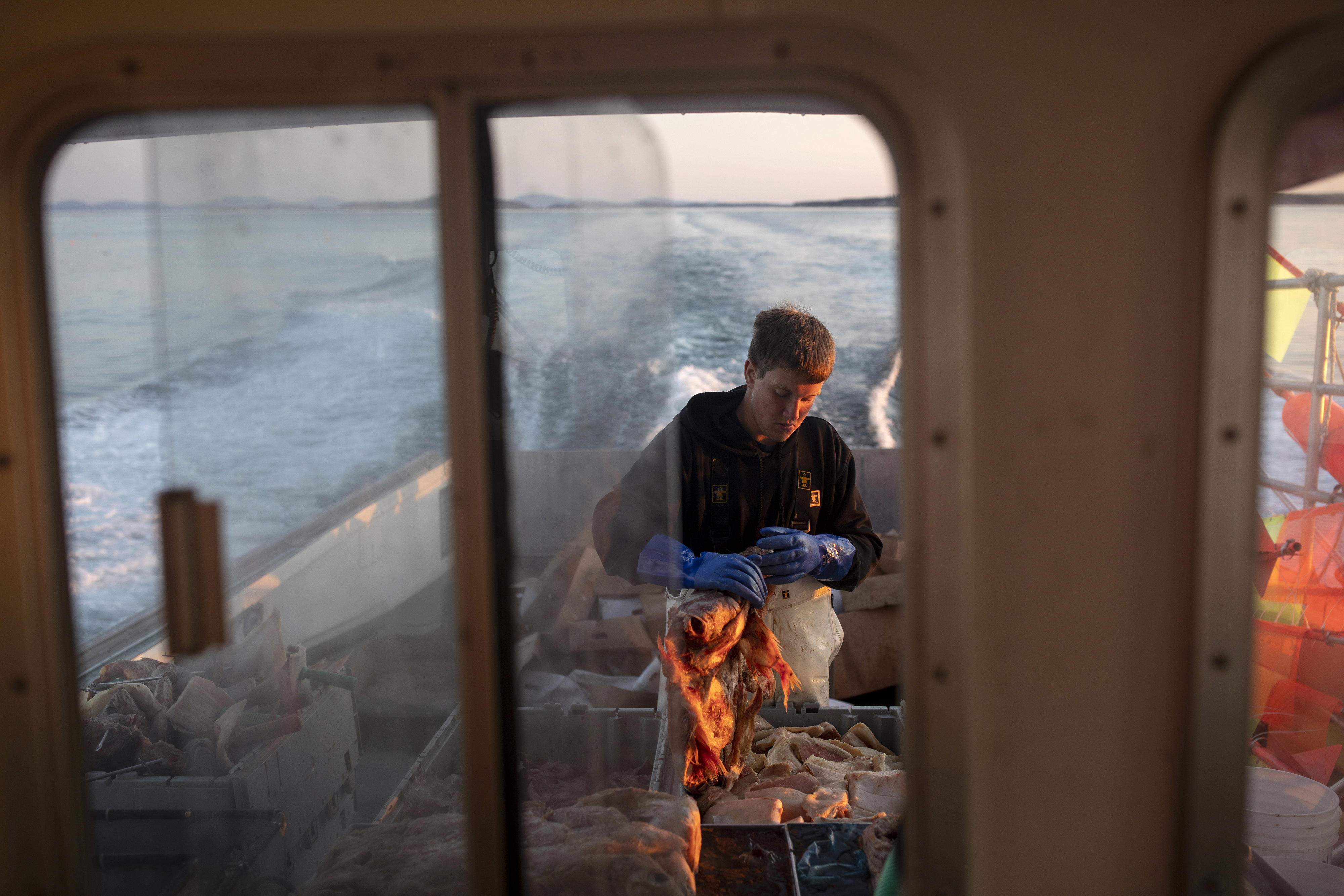
Around this island, hidden in plain sight, are signs that transformative change has come before. Boulders lie scattered in the woods near Folly Pond, on a hill 150 feet above sea level, the quiet here so pristine it feels untouched by time. But an expert eye sees evidence of prior climate churn: This elevated spot was probably once an ocean beach, 12,000 years ago, when melting Ice Age glaciers drove the ocean higher, and Vinalhaven and the Maine coastline were submerged beneath the sea as far inland as Bangor.
“When people say the sky is falling, I say, you’re right — and it has fallen before,” said George Kendrick, the resident geologist who led the island’s Main Street planning process. “It may seem silly to look back that far, but in geologic terms it’s the blink of an eye.”
Truth is, change and adaptation have been essential to human survival on this island since the Red Paint People fished here 5,000 years ago.
Two centuries ago, when Maine broke away from Massachusetts and became a state, Vinalhaven remained an island of fishermen. By 1850, though, the island’s top industry was its granite quarries, where an influx of European immigrants excavated, cut, and polished tons of the pinkish-gray rock and shipped it out on schooners for use in massive projects like the Brooklyn Bridge and the Washington Monument.
When steel and concrete overtook granite in construction, transforming the humming quarries into bucolic swimming holes, the island fell into economic decline, hastened by the collapse of cod and other groundfish stocks. By the late 20th century, beset with poverty, Vinalhaven faced another reckoning.
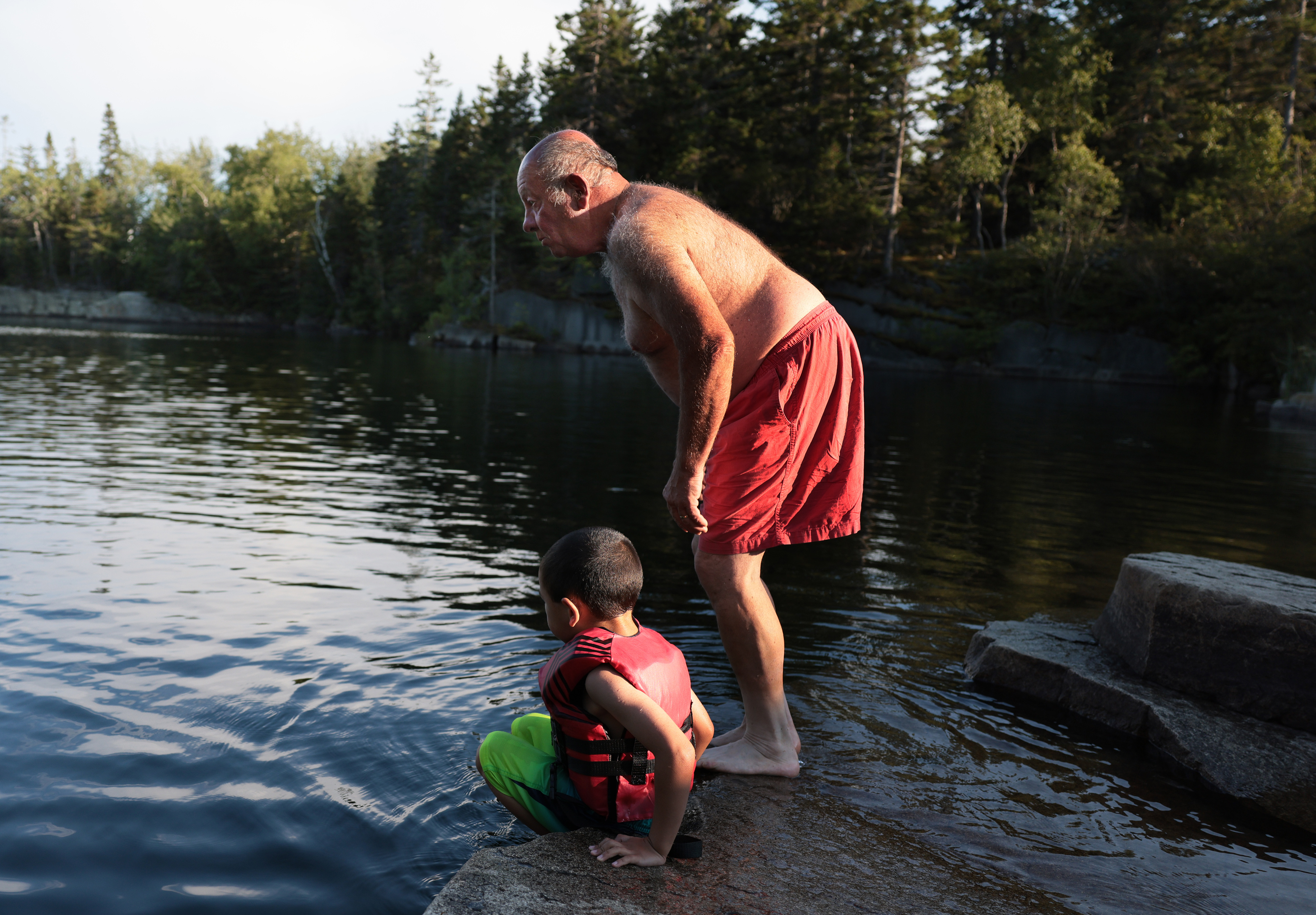
Climate change allowed it to recover, fostering unheard-of growth in lobster stocks just when fishermen needed a new target. This time, they fished wisely, using lessons learned from cod’s collapse to cultivate the long-term health of lobster stocks. But the same force that brought them prosperity — global warming — is beginning to take it away.
To survive, they must adapt again.
Regulators say one problem — the complicated conflict between fishermen and whales — can be solved with high-tech, pop-up fishing gear. (It is often called “ropeless” but that can be a misnomer.) In a common type, the buoys which used to float on the surface are stored with an attached rope inside the traps. When they are ready to haul their catch up, fishermen use cellphones or laptops to trigger the buoy’s release.
The government’s Aug. 31st decision banned traditional roped gear in an area about two-thirds the size of Rhode Island, about 30 miles off the Maine coast, stretching from Bar Harbor to Boothbay, during the lucrative four-month stretch from October through January. That’s when, scientists say, whales are likeliest to pass through on their way south from Canada to their calving grounds off Georgia and Florida.
No other major port sits closer than Vinalhaven to the waters marked for closure.
The ropeless gear — which is still being tested and could be years away from the commercial market — presents an opportunity for lobstermen bold enough to try it. Because the rope ban will keep most boats out, those who do adapt stand to make a killing.
That’s the view of Andrew Dorr, Vinalhaven’s town manager, who wants to help fishermen make the transition.
“If the 10-year outlook is, we’re going to lose boats,” Dorr said, “let’s not wait until year nine.”
In his office at Vinalhaven’s town hall — a graceful former school building, built in 1896 and perched on a hill above Main Street and the harbor — Dorr strives to balance his own sense of urgency with the mood of the islanders he serves and the board of selectmen that sets his agenda.
The administrator has won acceptance here by listening and championing their way of life. But the 34-year-old remains a newcomer “from away,” as Mainers say, with instincts shaped by his own very different upbringing and experience.
If it were up to him, Dorr would have already bought or borrowed a set of ropeless fishing gear and offered it on loan to the island’s lobstermen, to help them start to grapple with the change that looms ahead.
Instead, he has had to drift with the current, skirting obstacles he cannot move, like the fishermen’s resistance.
Still, Dorr sees a potential path forward. After the government’s decision, he headed downhill from his office to the waterfront to listen to the fishermen, leaning in over breakfast at the diner as he tried to read between the lines: Is there a chance they will try the ropeless gear?
He set a meeting with the manager of a local lobster wholesaler, to see what she thinks. Across a wooden table at town hall, she tells Dorr she believes she knows at least one open-minded captain who will risk it.







Johnny and Ali McCarthy sat together in their living room one morning in September, after dropping their children at school, to try and decide what they will do.
When the new rules were announced, McCarthy had told his wife he needed time to mull his decision.
Now, McCarthy thinks he has a plan, one that he has been quietly kicking around for a couple of months: He will adapt to the whale rule, even though he thinks it’s unfair, and give the ropeless gear a shot. If it works, he can fish his big new boat in the waters that will soon be closed, and bring home more lobsters than he ever has before.
“I mean, I’m 33 years old,” he said. “Am I supposed to never fish there again? Why not keep an open door and try it?”
Ali McCarthy frowned, her lips pursed, her eyebrows lowered. She shook her head.
“A lot of people would see that as laying down and taking it,” she warned. “People aren’t going to like that. People will want to see you fight back.”
A few days earlier, one of McCarthy’s crew had issued the same warning as the two men headed out to fish: Try it, and a lot of people will be angry … angry enough, maybe, to cut your gear.
McCarthy hunted for a comfy position in his leather recliner, Ali curled up on a couch beside him. He felt paralyzed by the bind he’s in. He needs to keep fishing to support his family. But he can’t risk the goodwill of his tiny island.
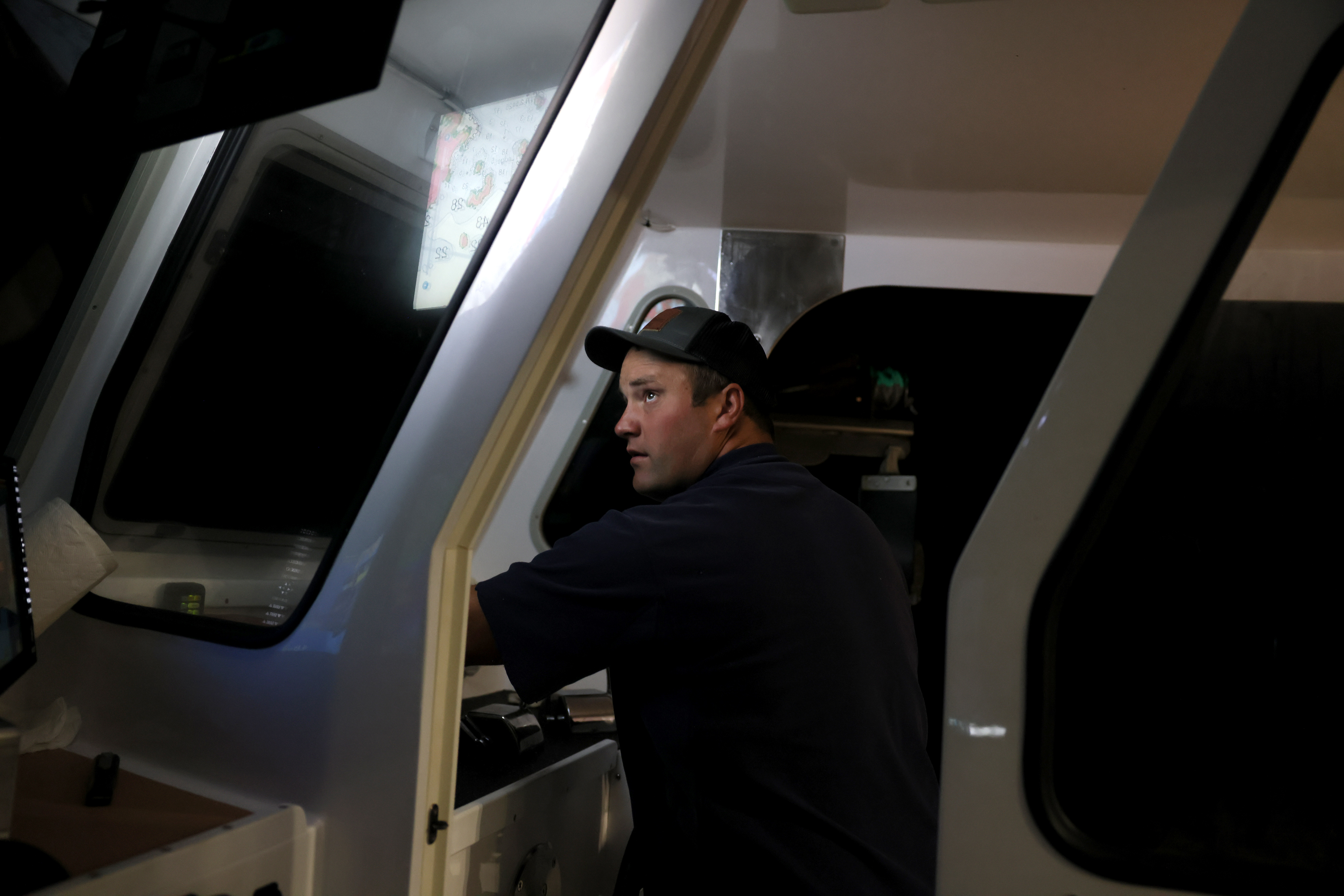
In the weeks and months to come, a clear resolution will be hard to come by. In October, the shutdown was postponed, a surprise twist courtesy of Thompson’s long-shot lawsuit. By mid-November, another judge overturned that decision. The union asked the US Supreme Court to intervene, but that request was rejected without comment.
And two weeks ago, on a gusty, early December day, the first-ever ban on traditional lobstering off Maine’s coast was quietly enacted after all.
At the moment, Vinalhaven is enveloped in a winter chill. The leaves have fallen; the quarry swimming holes are starting to freeze over. McCarthy has decided not to try the ropeless gear, to resist change, holding out hope that other legal challenges will somehow prevail and postpone a future he’s not yet ready to accept.
Meanwhile, beneath his boat, the Gulf of Maine keeps warming, ever so slowly, his way of life slipping further and further away.
Jenna Russell and Penelope Overton reported from Maine. David Abel reported from Canada.
‘The Lobster Trap’ is a project of the Spotlight Fellowship program, funded by Participant, co-producers of the movie ‘Spotlight.’
Credits
- Reporters: Penelope Overton, Jenna Russell, David Abel
- Photographers: Jessica Rinaldi and Brianna Soukup
- Editors: Brendan McCarthy, Scott Allen, Mark Morrow, Steve Greenlee, Jason Tuohey
- Design: Ryan Huddle, Matt Fulton
- Homepage & app: Yiqing Shao, Leah Becerra, Lauren Booker
- Developers: Daigo Fujiwara, John Hancock, Vince Dixon, Todd Dukart
- Graphics: John Hancock and Vince Dixon
- Photo editors: William Greene, Michele McDonald, Leanne Burden Seidel
- Video producer and editor: Caitlin Healy
- Copy editors: Mary Creane, Michael Bailey, Brian Robitaille
- Social media: Christina Prignano, Devin Smith, Maddie Mortell, Katherine Lee
- Analytics & engagement: Karla Ovalle
- SEO: Cameron Muir
- Newsletters: LaDonna LaGuerre, Emma Kelley, Marie Princiotto
- Quality assurance: Jackson Pace
© 2022 Boston Globe Media Partners, LLC
